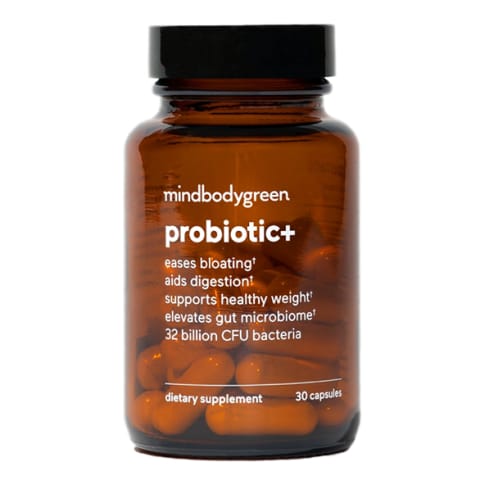Advertisement
How This Functional Medicine Expert Lays The Foundation For A Healthy Gut: Morning, Noon & Night


As one of the OG mindbodygreen contributing experts, I am no stranger to the immense importance of supporting our gut health. In fact, since starting one of the first telehealth functional medicine clinics over a decade ago, I have consulted thousands of patients on their well-being journeys, and I have found the one thing almost everyone has in common: trouble supporting gut health.
As the foundation of your overall health, a thriving gut microbiome is crucial. It's something I value for my patients and my own health—as such, I've made a conscious effort to nurture my gut on a daily basis.
I have found that by integrating a few simple practices throughout my days, I can lay the foundation for a thriving gut microbiome morning, noon, and night. This personal gut health routine gives me confidence that I'm setting my digestive system up for success. So, without further ado, these are my daily habits that you can implement on your own gut-healing journey, too.
Morning: I intermittent fast.
As the author of Intuitive Fasting, I am a big advocate for periods of flexible, cyclical fasting. Digestion alone uses 10% of your body's total energy and requires a lot of work to produce saliva and stomach acid, regulate hunger signals, and break down macronutrients. If I am constantly eating, my gut doesn't get much of a break.
By giving your gut the time off it desperately needs, fasting helps to ease inflammatory processes in your gut1 while also lowering key markers of inflammatory health1 throughout your body. Fasting has also been shown to regulate your gut microbiome's natural circadian rhythm of bacteria: Different colonies of bacteria increase and decrease throughout the day depending on whether you are awake, sleeping, or eating—but constant eating can throw off your gut microbes' normal pattern.
Fasting can look different for everyone, but I have found it the easiest to practice a 12-to-6 window of fasting. After eating my last meal at 6 p.m. the night before, I skip breakfast and have my first meal at 12 p.m. This allows for 18 hours of uninterrupted fasting time—mostly during sleeping hours—and eliminates the need for extra breakfast prep. No mess and less stress.
Afternoon: I eat a higher-fat and fiber-rich meal.
When it comes time to break my fast, the type of meal that I eat in the afternoon is just as important as the meal I don't eat in the morning. Regardless of whether my meal is more plant-based or I choose to have some fish or meat that day, I make sure it is filled with healthy fats.
Healthy fats from omega-3s have been shown to positively affect your gut microbiome2 composition and your gut-brain axis. Regardless of whether you are keto, paleo, vegan, eat meat, or have specific dietary restrictions, incorporating more healthy fats into your day can help keep your blood sugar stable and increase the diversity of your gut microbes.
In addition to healthy fats, incorporating fiber from vegetables and fruits is very beneficial for a healthy gut microbiome. You've heard it said "We are what we eat"—but truthfully, we are in some ways more what our gut microbiota eat. The trillions of bacteria in the different colonies of the gut microbial metropolis eat what we eat and they love fiber from whole foods. Consuming and fermenting the fiber from our meals, bacteria produce something called short-chain fatty acids like butyrate, which is very beneficial for not only gastrointestinal health but also our immune system, metabolism, and brain health.
So what does a meal with healthy fats and fiber look like? Wild-caught fish and avocados are my personal go-to's, but a variety of grass-fed beef, coconut, olives, Swiss chard, sweet potatoes, chia, flax, and hemp seeds are all great options as well.
To help with that gut bacteria diversity, I sometimes also reach for a high-quality probiotic supplement with science-backed strains, for extra targeted support.*
Night: I practice mindfulness
Stress is a part of life. And after a busy day at work, my mind is racing. Even though these thoughts aren't always inherently stressful or anxious, they can nonetheless become a point of stress if I don't address them.
If out of control, stress can lead to consistently high levels of the primary stress hormone cortisol and lead to decreased oxygen delivery to your gut. Because of the special connection between your gut and brain—also known as the gut-brain axis—stress can directly affect the health of your gut.
To combat this, I always turn off my phone an hour or two before bed and set it in another area of my house and close out my evening with mindfulness. Not only does this reduce stress, but it sets me up for an uninterrupted night of sleep, which is also important considering a lack of sleep further perpetuates the cortisol cycle that affects your gut.
Meditation is my personal favorite form of mindfulness, but you can switch it up with prayer, journaling, or going on a walk.
While there are endless tools, supplements, and foods that can positively influence your gut health, it's not always realistic or helpful to incorporate every single one into your daily routine. However, by establishing a few consistent daily practices like these, you can be on your way to a healthy foundation that you can build on, depending on your personal gut goals.
Watch Next
Enjoy some of our favorite clips from classes
Enjoy some of our favorite clips from classes
What Is Meditation?
Mindfulness/Spirituality | Light Watkins
Box Breathing
Mindfulness/Spirituality | Gwen Dittmar
What Breathwork Can Address
Mindfulness/Spirituality | Gwen Dittmar
The 8 Limbs of Yoga - What is Asana?
Yoga | Caley Alyssa
Two Standing Postures to Open Up Tight Hips
Yoga | Caley Alyssa
How Plants Can Optimize Athletic Performance
Nutrition | Rich Roll
What to Eat Before a Workout
Nutrition | Rich Roll
How Ayurveda Helps Us Navigate Modern Life
Nutrition | Sahara Rose
Messages About Love & Relationships
Love & Relationships | Esther Perel
Love Languages
Love & Relationships | Esther Perel
What Is Meditation?
Box Breathing
What Breathwork Can Address
The 8 Limbs of Yoga - What is Asana?
Two Standing Postures to Open Up Tight Hips
How Plants Can Optimize Athletic Performance
What to Eat Before a Workout
How Ayurveda Helps Us Navigate Modern Life
Messages About Love & Relationships
Love Languages
Advertisement

This Little-Known Supplement Helps Women Sleep & Decreases Signs Of Depression
Molly Knudsen, M.S., RDN

This Little-Known Supplement Helps Women Sleep & Decreases Signs Of Depression
Molly Knudsen, M.S., RDN
















